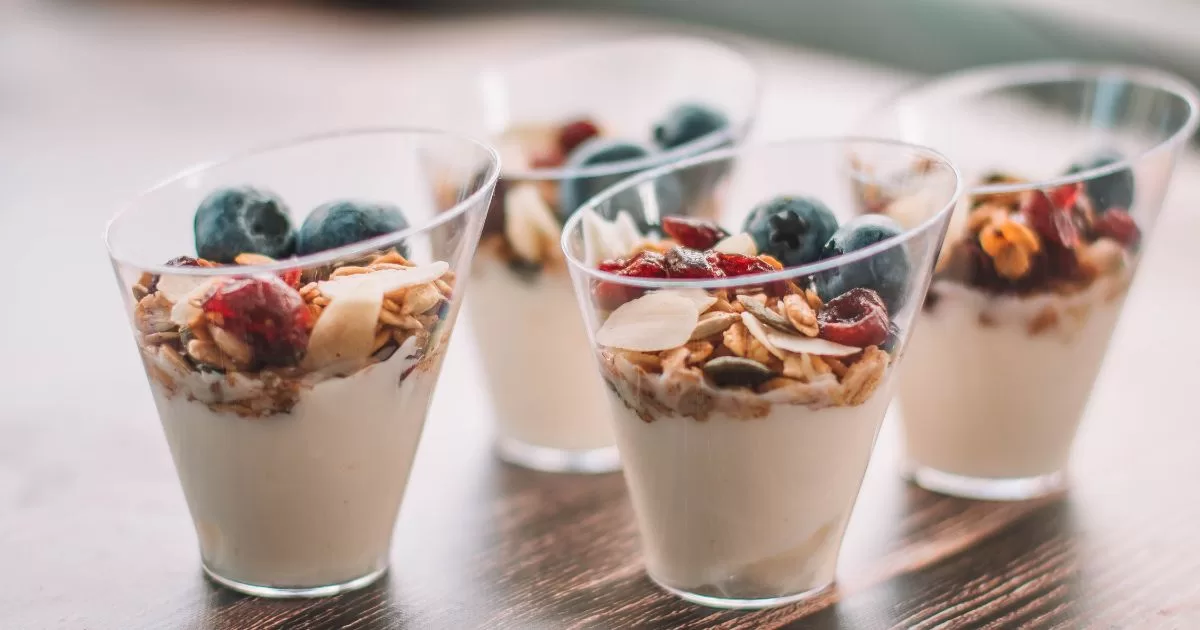Curd, also known as yogurt, has secured a position in our diets around the world from very ancient days. This dairy product is not only delicious but also offers several health benefits starting from aiding in digestion to bolstering the immune system.
Whether enjoyed on its own, in recipes, or as a topping, this versatile dairy product can be a valuable addition to your diet. So, get creative in the kitchen and let curd be your new go-to ingredient for a healthy and delicious lifestyle.
Curd is a nutritional powerhouse for which it deserves a place in your daily diet. In this article, we’ll explore the various health benefits of curd by including it in your meals.
Health Benefits of Curd

1. Rich In Probiotic
One of the most significant benefits of curd is that it is full of probiotics. These are good bacteria that promote a healthy balance of microorganisms in the digestive system.
Probiotics help to improve gut health and help in digestion and absorption of nutrients. They also help to prevent and alleviate several gastrointestinal problems such as diarrhea, irritable bowel syndrome (IBS), and inflammatory bowel disease (IBD).
Adding curd to your daily diet helps you to maintain good health.
2. Boosts Immunity
The probiotics present in curd not only support digestive health but also strengthen your immune system. A significant portion of the body’s immune response is housed in the gut. So making a balanced gut microbiome is helpful for your body’s overall immunity. Regular consumption of curd can help fortify your body’s defense system against various critical infections and diseases.
3. Rich Source of Essential Nutrients
Curd is packed with essential nutrients such as calcium, protein, potassium, and vitamin B12.
Nutritional facts of Curd (yogurt)
Before going forward you should know the nutritional facts of curd. Here are the nutritional facts for a typical serving (100 grams) of plain, whole-milk curd:
- Calories: 98 kcal
- Protein: 3.4 grams
- Fat: 4.3 grams
- Saturated Fat: 2.7 grams
- Monounsaturated Fat: 1.1 grams
- Polyunsaturated Fat: 0.1 grams
- Trans Fat: 0 grams
- Cholesterol: 14 mg
- Carbohydrates: 4.7 grams
- Dietary Fiber: 0 grams
- Sugars: 4.7 grams
- Calcium: 110 mg (11% of daily value)
- Sodium: 36 mg
- Potassium: 141 mg
- Vitamin A: 108 IU (2% of daily value)
- Vitamin C: 1 mg (2% of daily value)
- Vitamin D: 0.5 µg (3% of daily value)
- Vitamin B12: 0.5 µg (21% of daily value)
- Iron: 0.1 mg (1% of daily value)
- Magnesium: 11 mg (3% of daily value)
Calcium is beneficial for strong bones and teeth, while protein is essential for muscle repair and growth. Additionally, potassium present in curd helps to regulate blood pressure.
Vitamin B12 supports nerve function and the production of red blood cells.
4. Aids Digestion
One of the most important benefits of curd for the stomach is that it aids in digestion. The presence of live cultures in curd promotes the breakdown of lactose, making it easier to digest for individuals who are lactose intolerant.
Additionally, curd helps in the absorption of nutrients from other foods, ensuring that your body gets the maximum benefit from your diet.
5. Promotes Weight Management
Curd is a valuable addition to any weight management plan. The high protein content helps you feel fuller for longer, reducing the likelihood of overeating by minimizing the carving for food. Additionally, the calcium in curd helps to lower body fat.
All these factors help to manage the weight in a better way. So incorporating curd in your daily diet helps in weight loss.
6. Supports Heart Health
One of the major health benefits of yogurt is that it helps to maintain a healthy heart. Regular consumption of curd has been linked to a reduced risk of heart disease.
The probiotics and nutrients in curd contribute to lower blood pressure and cholesterol levels. Additionally, the potassium content in curd helps to regulate blood pressure, which is the key to a healthy cardiovascular system.
7. Aids in Detoxification
Over time, our body generates several toxins. If those are not removed from our body that will result in several diseases.
Curd contains lactic acid, which helps in the elimination of harmful toxins from the body. This contributes to a healthier, more balanced body.
8. Benefits of curd on Hair

Curd has tremendous benefits on hair. Curd can be used as a natural hair conditioner or can be applied on the hair along with several ingredients like lemon, Heena & aloe vera to give shine and strength to your locks.
also read A Guide to Optimal Hair Care.
9. Benefits of curd on the face

The probiotics and nutrients in curd can have positive effects on skin health. Applying curd on the face as a face mask or consuming it can help alleviate skin conditions like acne, eczema, and dryness.
Also, read How to take care of your skin
Conclusion
Incorporating curd into your diet is a simple and delicious way to reap these numerous health benefits. Whether enjoyed on its own, in smoothies, or as a condiment, curd is a versatile ingredient that can easily be integrated into your daily meals. Remember to choose high-quality, organic options for the maximum nutritional benefit. So, indulge in this creamy delight and let your body thank you for it!
Tips for Maximizing Curd’s Benefits
Now that we’ve explored the amazing benefits of curd, let’s further explore some tips on how to make the most of this nutritious dairy product:
1. Opt for Plain, Unsweetened Varieties
When selecting curd, choose plain, unsweetened varieties without added sugars or artificial flavors. This ensures you’re getting the full nutritional benefit without unnecessary additives.
2. Experiment with Homemade Curd
While store-bought curd is convenient, making it at home allows you to control the quality of the milk and the fermentation process. Homemade curd is often richer in probiotics and free from preservatives.
3. Include it in Your Breakfast Routine
Start your day on a healthy note by incorporating curd into your breakfast routine. Mix it with fruits, nuts, and a drizzle of honey for a delicious and nutritious parfait. Alternatively, you can use it as a base for smoothies or overnight oats.
4. Enhance Your Savory Dishes
Curd can be used as a creamy and tangy addition to various savory dishes. Use it as a marinade for meats or vegetables or as a base for salad dressings and dips. Its versatility makes it a valuable ingredient in a wide range of cuisines.
5. Combat Lactose Intolerance
Curd can be a more easily digestible alternative to milk if you’re lactose intolerant. The live cultures in curd help break down lactose, making it gentler in the digestive system.
7. Incorporate in Post-Workout Snacks
The high protein content in curd makes it an excellent post-workout snack. Mix it with fruits or granola for a quick and replenishing option to support muscle recovery.
8. Explore Fermented Varieties
In addition to regular curd, consider exploring fermented varieties like Greek yogurt. These often contain even higher concentrations of probiotics and can offer a wider range of flavors and textures.
9. Practice Moderation
While curd offers numerous health benefits, like any food, it’s best enjoyed in moderation. Balance it with a variety of other nutrient-rich foods to ensure a well-rounded diet.
Frequently Asked Questions
1. Is curd good for digestion?
Yes, curd is rich in probiotics, which are beneficial bacteria that support a healthy digestive system. They help maintain a balanced gut microbiome and aid in digestion.
2. Can curd help with weight loss?
Yes, curd can be beneficial for weight management. The protein content in curd helps increase satiety, making you feel fuller for longer, which can reduce overeating.
3. Does curd promote hair growth?
Yes, curd is a rich source of protein and essential nutrients that strengthen hair follicles and promote hair growth, leading to thicker, more voluminous hair.
4. How does curd benefit the skin?
Curd can be used topically as a natural moisturizer and exfoliant. It helps hydrate the skin, reduce acne, and improve skin texture, leaving it soft and radiant.
5. Can curd help reduce dandruff?
Yes, the probiotics in curd help maintain a healthy scalp environment, reducing common scalp issues like itching and dandruff.
6. Is curd suitable for lactose-intolerant individuals?
Some lactose-intolerant individuals may be able to tolerate curd because the probiotics in curd help break down lactose. However, it’s essential to consult a healthcare professional for personalized advice.
7. Can curd be used as a natural conditioner for hair?
Yes, curd serves as an excellent natural conditioner. It moisturizes and hydrates the hair, leaving it softer, smoother, and more manageable.
8. Does curd have any anti-aging benefits for the skin?
Yes, the lactic acid in curd acts as a gentle exfoliant, promoting cell turnover and reducing the appearance of fine lines and wrinkles.
9. Can curd be consumed by individuals with dairy allergies?
Individuals with dairy allergies should avoid curd, as it is a dairy product. There are dairy-free alternatives available, such as coconut or almond-based yogurts.
10. Is it better to consume homemade or store-bought curd for maximum benefits?
Homemade curd is generally recommended, as it contains live cultures and is free from additives or preservatives. However, if choosing store-bought, opt for varieties with live active cultures.
11. Can curd be used for sensitive skin?
Yes, curd is gentle and can be suitable for sensitive skin. However, it’s important to do a patch test first to ensure there are no adverse reactions.
12. How often should I use curd for hair and skin benefits?
The frequency of use depends on individual preferences and skin/hair type. For most people, using curd as a hair or skin treatment 1-2 times a week can yield positive results.
